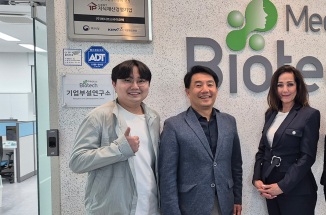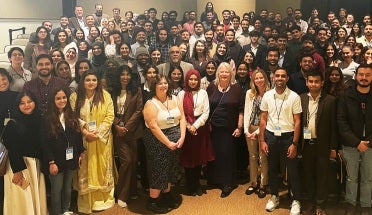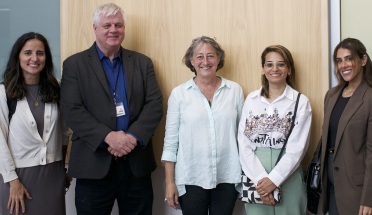
Global Innovation Lab Facilitates Multimillion-Dollar Biomed Deal
- Jul 30, 2024
- Global Innovation Lab
- by Alex Briseño
The Global Innovation Lab (GIL) at The University of Texas at Austin orchestrated a United States joint venture company agreement that stands to raise $35 million for an innovative new product, which would mark the largest financial commitment achieved in the lab’s decades-long history.
The agreement, facilitated by GIL at Texas Global and signed by Medicos Biotech Co. and Rokline Health Concepts, surrounds Medicos’ breakthrough development of biosynthetic spider silk protein-based wound healing patches that were developed to efficiently treat open wounds, pressure ulcers and severe burns.
Medicos, a health care startup from South Korea, and Rokline, a Houston medical company, signed the agreement in Seoul on June 12, officially creating the joint venture, MediRok, which will be located in Houston.
“It is certainly gratifying to be part of the largest initial upfront deal and investment commitment in the 24-year history of the Global Innovation Lab,” said John O’Neill, GIL program manager. “But, much more importantly, no financial return can ever be as fulfilling as being part of the development and introduction of a lifesaving technology.”
This deal was facilitated by GIL in tandem with a longtime partner, the Korea Advanced Institute of Science and Technology (KAIST). Through the KAIST GlobalUP Program, established in 2010 and funded by the Daejeon city government, Texas Global and KAIST recruit and evaluate high-impact startups. Selected startups then visit UT Austin as GIL and KAIST facilitate relationships with them in the U.S. and other global markets, performing market research and international business development services.
“This new innovation will save and change lives, especially in developing countries where accidents often occur far from medical care facilities,” O’Neill said. “GIL is proud to contribute to and be part of UT Austin’s slogan of What starts here changes the world.”
Connecting Global Companies
Sooncheol Daniel Kim, co-founder and co-CEO at Medicos, first traveled to UT Austin for a GIL program in 2022. He returned in July 2023 to work with Texas Global on finding sales partners for their spider silk protein-based products, this time with a narrowed focus on chronic wound-healing patches.
After analyzing Medicos’ technology, business model, competitors and management, GIL’s search for suitable partners led Medicos to Rokline Health Concepts.
“Texas Global efficiently developed the business side of the spider silk protein wound-healing patches,” Kim said. “They sought and identified possible candidates for our product. I was introduced to a few companies, but Medicos and Rokline felt instinctual. We talked for more than one year, and UT Austin helped us through each development from the first meeting.”
Once Rokline received medical expert verification, GIL and Rokline identified a team of potential investors by late September 2023 who were interested in supporting Medicos’ product through the Food and Drug Administration (FDA) clinical trial and approval process.
“Rokline had extensive contacts with the Houston medical investment community,” O’Neill said. “After various pitches, GIL and Rokline were able to garner interest from a team of investors to commit to a major investment once the new company was incorporated and registered with the U.S. Securities and Exchange Commission.”
Finalizing a Deal
Rokline, a partner and investor with a dedication to early disease detection and personalized treatment, had previously evaluated a blood biomarker for the early detection of cancer that was also introduced to them by Texas Global. The company expressed sustained interest in biotechnology products moving forward, making for a perfectly compatible partnership with Medicos.
GIL served as a mediator during Medicos and Rokline’s diligent negotiations of the terms and conditions of the new joint venture company. These successful efforts resulted in a memorandum of understanding signed by both parties in April, followed by the formal contract agreement to create the joint venture company in June 2024.
Herbert Fritsche, Ph.D. — co-CEO and co-founder of Rokline Health Concepts, along with Ann Thomas — noted that Rokline squarely aligns with Medicos through their passion for introducing cutting-edge medical products to patient care.
“We share the same goals, see the need for working together and both believe in the value of the silk protein-based products. Once we obtain funding, we will be able to accomplish our goals in a timely manner,” Fritsche said of the partnership. “The excitement results from the opportunity to make a significant contribution to health care and to the many patients afflicted by the diseases we hope to cure.”
Developing a Breakthrough Product
Created in 2018 as an official spinoff venture of KAIST, Medicos was founded on the world’s first spider silk protein production technology. The technology was pioneered by Sang Yup Lee, a KAIST professor and global leader in metabolic engineering.
More than five years after its formation, Medicos believes its biosynthetic spider silk protein wound-healing patches are ready to debut on the market as a revolutionary health care product. That confidence derives from the strength of their product — and the fact that, for centuries, spider silk has been utilized in wound-healing methods dating back to the ancient Greeks.
“Recombinant spider silk protein is a repetitive structural protein containing alanine and glycine as main components, with a large size and excellent properties,” said Dr. Won Min Yoo, co-CEO and co-founder of Medicos. “It enhances protein interactions significantly, improves cell attachment and enhances drug delivery effects.”
Medicos’ spider silk protein additionally exhibits excellent biocompatibility and biodegradability as a protein material, Kim explained, pointing out that it is hypoallergenic, offers a moisturizing and anti-wrinkle effect and improves cell generation, all while protecting the skin.
The development and testing of the silk proteins were conducted at KAIST. Lee’s extensive experience with recombinant energy is what Fritsche credits for the adaptation and optimization of silk protein production.
“Biosynthetic silk protein is produced in fermentation tanks by organisms which have had the silk protein genes inserted into its DNA using recombinant DNA technology,” Fritsche explained. “The patented process for production results in significantly improved volume of product, thus reducing the cost.”
Building Momentum

The next phase for Medicos and Rokline is establishing the joint venture company MediRok in August with KAIST’s original silk protein-producing technology. After building out MediRok’s team, the company looks forward to beginning the clinical trials and the FDA approval process with the goal of entering the global market within three years.
“We additionally plan to further develop pharmaceuticals utilizing spider silk protein characteristics, such as spinal cord nerve regeneration and cancer diagnostic markers, as well as cosmetic products,” Kim said. “There are no visible obstacles because we both believe spider silk protein is a revolutionary biomaterial that can practically be applied to many industries.”
Expanding Business Impact
For Texas Global, this work extends the international footprint of UT Austin, GIL and Texas Global, not only in Korea but also in Japan, Singapore, Indonesia, Thailand and Saudi Arabia, which are home to additional GIL programs. O’Neill also noted that deals of this size anchor GIL’s trust and credibility with U.S. buyers and companies, key components that continue to make GIL’s programs effective and successful.
From a Korean brake-parts supplier amassing $28 million over a 10-year period to a small Korean startup signing a Space Act Agreement with NASA to license their green electric magnet, GIL and KAIST continue to make a global impact together. MediRok is just the latest example.
“Large deals are important, as they provide proof of GIL’s abilities and the effectiveness of our work,” O'Neill said. “But the primary benefit that we provide in all of the countries we work in is the training and education of any country’s most valuable resource: its people. Then, directing them toward the development or improvement of their region’s entrepreneurial ecosystem.”



